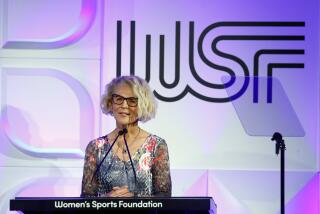Marla Messing’s big thinking made Women’s World Cup huge
When Marla Messing left her mark on the world stage a decade ago, it was not in the way she first imagined.
As a youngster, Messing was inspired by Olga Korbut and Cathy Rigby and envisioned a future as an Olympic gymnast.
Instead, burned out on gymnastics in her teens, she settled for being “the Peter Ueberroth of the Women’s World Cup.”
That’s how Messing, 45, describes her role as CEO and president of the soccer spectacle that unexpectedly swept U.S. sports fans off their feet in the summer of 1999.
The three-week tournament, which ended 10 years ago this week with the U.S. defeating China in the championship match at the Rose Bowl and Brandi Chastain famously stripping off her jersey, was history’s most successful women’s athletic event.
“Beyond our wildest dreams,” Messing says of the extraordinary interest that was generated that summer. “Remember, this was women’s soccer . . . so we’re talking about a women’s event in sort of a marginal sport. It was lightning in a bottle.”
The event drew more than 650,000 fans, including Jack Nicholson and President Clinton, who were among the 90,185 on hand for the Rose Bowl finale. Clinton rushed to the locker room to congratulate the winners after the championship match, which attracted nearly as many television viewers -- 40 million -- as the NBA Finals. An obviously smitten David Letterman dubbed the team “babe city” and declared himself team owner.
Afterward, the event was featured not only on the cover of Sports Illustrated, which was surprising enough, but also on the covers of Newsweek, Time and People, the latter of which declared the U.S. team “the pop culture story of the year.”
Ten years later, Messing still seems to have a hard time digesting it all. During a lunchtime interview at a Brentwood eatery near her home, she says of the hoopla inspired by the tournament, “None of that was part of our planning.”
Which is not to say Messing doubted the potential widespread appeal of the event. It was she who ignored skeptics and led the push to turn it into a major happening.
“She orchestrated it all,” Julie Foudy, who captained the U.S. team, says in a phone interview. “It was phenomenal in a lot of different ways because there were a lot of people telling us to do it on a regional scale, do it in smaller stadiums, play it safe.
“But Marla, thankfully, was of a mind-set that we could pull off something greater and that it should be done on a larger scale and that it deserved the world’s attention.”
FIFA, soccer’s international governing body, wanted the event to be staged in small stadiums along the East Coast, Messing explains, but she believed its appeal was broader and that it could be sustained in larger stadiums from coast to coast.
That was due in part to her belief in Team USA, which was led by popular scoring sensation Mia Hamm and was a prohibitive favorite after winning Olympic gold three years earlier in front of an adoring, overflow crowd in Atlanta.
“You could see that people connected with this team,” says Messing, a lawyer. “First of all, they were great athletes, beautiful role models, All-American girls, attractive, intelligent, educated. Plus, they loved the sport and were willing to give back to the fans.”
A mother of three daughters, ages 8, 10 and 12, Messing admits that she too was enthralled by the U.S. team.
“I feel tremendously proud to have been a part of it, in whatever small way that I was,” she says of the watershed event she shaped, “but that team owns that moment in history.”
Sister-in-law of actress Debra Messing, the former CEO has devoted the last 10 years to reconnecting with her family. Her husband, Brett, is a hedge-fund manager.
Though she tackles intermittent projects and sits on the board of the Southern California Committee for the Olympic Games, which bids to bring future Games to the region, Messing is “primarily a stay-at-home mom,” she says. “But I have three kids that play soccer, so I’m sort of a soccer mom.”
Still, after first leading the marketing push for the 1994 men’s World Cup and then directing the three-year Women’s World Cup effort, she seems to miss the nonstop action.
“I don’t think I’ve replaced that,” she says, “but I will say that, in terms of the competition, there’s nothing more exciting than watching my kids play soccer. . . .
“Those games are every bit as exciting as watching the Women’s World Cup games 10 years ago or the men’s World Cup games. It might be hard to believe, but when you have such a personal stake in the kids out there on the field, it’s tremendous.”
Foudy calls it “wonderful” that Messing is a soccer mom, noting that Messing’s undying passion and belief in the sport led to her producing a transcendent moment in women’s athletics.
“I remember walking into Giants Stadium for that first game,” the former captain says. “We walked out to a standing ovation from 85,000 people and I thought to myself, ‘Thank goodness Marla and her team had the courage to go bigger.’ ”
Messing says she wouldn’t have had it any other way.
--
More to Read
Go beyond the scoreboard
Get the latest on L.A.'s teams in the daily Sports Report newsletter.
You may occasionally receive promotional content from the Los Angeles Times.










